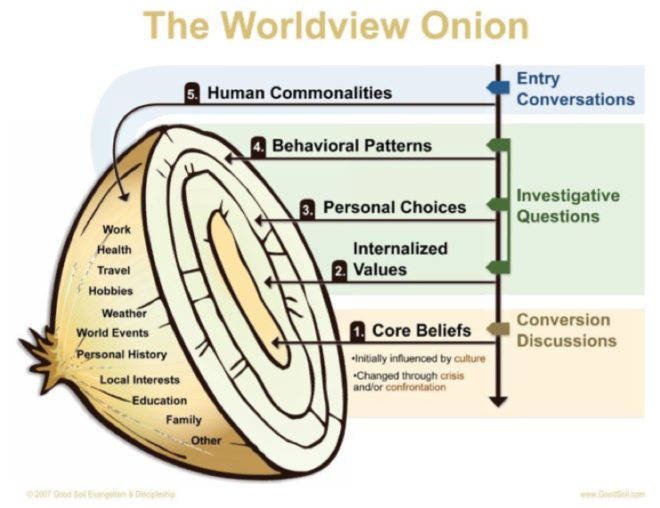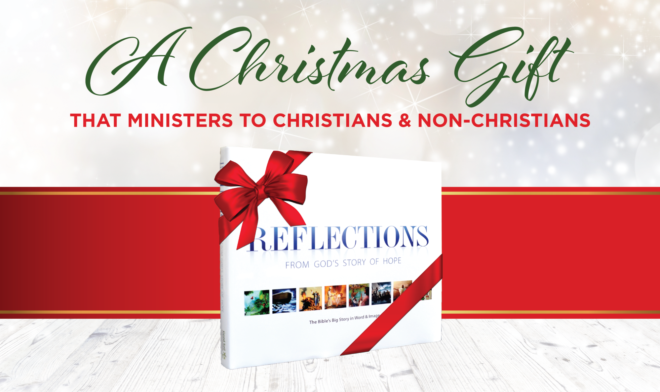Christmas – Evangelistic Discussion Openers

What’s the most popular American holiday? If the answer to that question is based on how many greeting cards are sent for the holiday, it’s Christmas and no other holiday even comes close. Hallmark says that 1.6 billion Christmas cards are sent per year, more than ten times as many Valentine’s cards.
Initially, Christmas was popular because of the theological significance of the event it represented—the birth of our Savior, Jesus the Christ. Although the original meaning of Christmas has become overshadowed by tinsel, Santa, and presents under the tree, most non-Christians in North American have enough “Christmas spirit” to listen to the deeper “old fashion” meaning of Christmas—a key event in the gospel story.
The Christmas season provides lots of opportunities for what we, at Good Soil Evangelism and Discipleship, call “onion peeling”—starting with safe “human commonality” topics and going deeper toward “conversion discussions” as an unbeliever responds to your “investigative questions.”

Five Evangelistic Discussion Openers for the Christmas Season
During the Christmas season, every American will repeatedly be exposed to a variety of Bible references to the birth of Jesus—in Christmas carols, Christmas cards, television ads, billboards, and other high-profile media. These public proclamations of the advent of God’s Son often can be used as safe entry points into gospel conversations.
Here are five questions that you might be able to use with your unbeliever-friends and other acquaintances at appropriate times and places during the Christmas season:
1. Have you ever wondered why baby Jesus was called a “Savior”?
Non-Christians need to understand why a Savior was and still is needed, and most importantly why THEY need Him! Otherwise, the nativity story is just about a baby who was born in difficult circumstances—the parents were away from home and they couldn’t find a decent place to stay while the mother was ready to give birth.
So, the Christmas story should begin in Genesis 3, with the disobedience of Adam and “the woman.” When the fall of mankind (doctrine of original sin) is clearly understood, Christmas takes on a much greater meaning. The manger scene is no longer just a screen-capture from a sentimental story. It’s a symbol of eternal hope and joy for you, me, and the whole world.
Your friend’s response to this “Savior” question will tell you a lot about her or his understanding of what the Bible teaches about sin and salvation.
2. What are your thoughts about how this whole “Christmas thing” got started?
Most North Americans, even the most secular, would know something about the Biblical story that originally made Christmas so popular. A good way to begin a redemptive conversation is to learn what they do know and do not know about the birth of Jesus, especially its true meaning. You can then build on what they tell you, ask deeper related questions, and share with them the gospel-related implications of His birth.
3. Like me, you have probably heard a lot about the Christmas story. Do you know much about the things that led up to that story?
Your friend’s response to this question, may create an opening for you to share a brief summary of the Old Testament’s storyline with them—how sin entered the world, how God promised a Savior, how the Old Testament sacrifices (“lambs”) were a temporary way of providing forgiveness of our sins, how the Old Testament prophets gradually made it clearer and clearer about the coming of a Savior, then how God announced to Mary that she would deliver that special Promised One, and how John the Baptist proclaimed that Jesus was the “Lamb of God.” You might want to practice sharing that story in three minutes or so, in order to tell it quickly and clearly.
For Christmas to be most meaningful, people need to understand the BIG Story context for the “Away in a Manger” story—why it was a desperately needed event and some of the key Old Testament events that set the stage for it.
4. You know, the song “Joy to the World” says the “Lord has come.” Have you ever wondered about baby Jesus being called “the Lord”? How do you understand that?
You can choose Biblical phrases out of many Christmas carols, such as this one, for discussion starters. If you are really interested in using the Christmas season to be a gospel-sharing season, take a look at the lyrics of some of the most popular Christmas carols and find phrases that you can use as evangelistic discussion starters.
5. From what you know about the story of the first Christmas—the birth of Jesus—what is most difficult for you to understand about that story?
This very open-ended question gives you an opportunity to start with a question your non-Christian friend may have had for a long time. It might be a question about the virgin birth of Jesus. Why the wise men would come so far and bring such valuable gifts? Why God chose to announce the birth of Jesus to shepherds before making it known to others? Why King Herod would want to kill the babies? Answer these questions, then keep the discussion going by asking other questions that gradually get to the core of the Christmas story.
Or, he or she may ask an “off-target” question such as, “How do we know Jesus was born on December 25?” Or, “Wasn’t Christmas originally just a pagan holiday?” Do your best to answer this question, then try to re-focus on a more important perspective related to the birth of Jesus.
The Reflections from God’s Story of Hope coffee table (picture-story) book is a great gift to give to your friends, believers and non-Christians alike. We designed it to be so appealing that even non-Christians won’t mind having it on their coffee table. And—it’s a great discussion starter resource.
It’s a $50 value, but to make it possible for you to share it with your friends, you can purchase the book for $20 each, if you buy a carton of eight or more.






